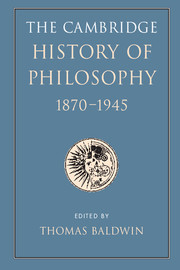Book contents
- Frontmatter
- Contents
- List of contributors
- Introduction
- I 1870–1914
- 1 Positivism, Idealism, and Pragmatism
- 2 Psychology and Philosophy
- 3 Logic, mathematics, and judgement
- 4 Philosophy and the new physics
- 5 The idea of social science
- 6 Ethics, politics, and legal theory
- 7 Philosophy of religion and art
- 24 Sceptical challenges to faith
- 25 The defence of faith
- 26 Art and morality: aesthetics at 1870
- 27 Form and feeling: aesthetics at the turn of the century
- Interlude
- II 1914–1945
- Biobibliographical appendix
- Bibliography
- INDEX
- References
24 - Sceptical challenges to faith
from 7 - Philosophy of religion and art
Published online by Cambridge University Press: 28 March 2008
- Frontmatter
- Contents
- List of contributors
- Introduction
- I 1870–1914
- 1 Positivism, Idealism, and Pragmatism
- 2 Psychology and Philosophy
- 3 Logic, mathematics, and judgement
- 4 Philosophy and the new physics
- 5 The idea of social science
- 6 Ethics, politics, and legal theory
- 7 Philosophy of religion and art
- 24 Sceptical challenges to faith
- 25 The defence of faith
- 26 Art and morality: aesthetics at 1870
- 27 Form and feeling: aesthetics at the turn of the century
- Interlude
- II 1914–1945
- Biobibliographical appendix
- Bibliography
- INDEX
- References
Summary
The 1870s were the high noon of nineteenth-century scientific rationalism in Europe. In the succeeding years to 1914 several important critiques of religion were advanced by philosophers and influential men of letters in France, England, and Germany.
THE CRITIQUE OF RELIGION IN FRANCE
In France, August Comte (1798–1857) was the leading proponent of mid- and late nineteenth-century scientific positivism. He also proved a formative critic of the European religious tradition. He declared it no longer credible and sought to replace Christianity with a religion that he baptised the Religion of Humanity. His writings on religion continued to have influence in Europe and North America in the latter decades of the nineteenth century.
While Comte disavowed Christianity, he undertook to establish a religion on the scientific principles enunciated in the six volumes of his Cours de philosophie positive (1830–42) (The Positive Philosophy of August Comte, 1853). In later writings, such as the four-volume Systéme de politique positive (1851–4) (The System of Positive Polity, 1875–7) and the Catéchisme positiviste, 1852 (The Catechism of Positive Religion, 1858), Comte brings together his positive philosophy (see chs. I and 18) and his vision of the Religion of Humanity. Some of his disciples repudiated the latter as a wholly foreign and superfluous addition to Comte’s positivism. It is clear from his earliest writings, however, that the creation of a new humanistic religion was integral to Comte’s positive programme. He was impressed by Catholicism’s proven social efficacy, and the Religion of Humanity can be viewed as an effort to simulate but secularise Catholic cult and organisation.
- Type
- Chapter
- Information
- The Cambridge History of Philosophy 1870–1945 , pp. 319 - 328Publisher: Cambridge University PressPrint publication year: 2003



